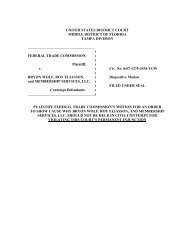HELO RCPT TO QUIT MAIL FROM DATA - Federal Trade Commission
HELO RCPT TO QUIT MAIL FROM DATA - Federal Trade Commission
HELO RCPT TO QUIT MAIL FROM DATA - Federal Trade Commission
Create successful ePaper yourself
Turn your PDF publications into a flip-book with our unique Google optimized e-Paper software.
Executive Summary<br />
i<br />
Executive Summary<br />
The <strong>Federal</strong> <strong>Trade</strong> <strong>Commission</strong> (the “FTC” or “<strong>Commission</strong>”) submits this<br />
Report pursuant to Section 11(2) of the Controlling the Assault of Non-Solicited<br />
Pornography and Marketing Act of 2003 (the “CAN-SPAM Act”), 15 U.S.C. §<br />
7710(2) (2003), which requires the <strong>Commission</strong> to submit “a report that sets forth<br />
a plan for requiring commercial electronic mail to be identifiable from its subject<br />
line . . . or an explanation of any concerns the <strong>Commission</strong> has that cause the<br />
<strong>Commission</strong> to recommend against the plan.”<br />
A subject line labeling requirement would compel senders of unsolicited<br />
commercial email (“UCE”) to include specific characters, such as “ADV,” in the<br />
subject lines of their messages. The idea is that subject line labeling could make it<br />
easier for Internet Service Providers (“ISPs”) to identify and screen out unwanted<br />
UCE, and for consumers to block or segregate UCE, or to tell at a glance whether<br />
individual messages that reach their in-boxes are commercial. Thus, subject line<br />
labeling may appear to offer a simple legislative fix, theoretically making it easy<br />
to either completely block all unwanted commercial email or to segregate UCE<br />
from other email messages.<br />
The <strong>Commission</strong>, however, strongly doubts that such an outcome would<br />
result. The <strong>Commission</strong> comes to this conclusion after examining the likely<br />
benefits of an ADV labeling requirement applicable to all UCE, including email<br />
messages sent by legitimate marketers. Experience with subject line labeling<br />
requirements in the states and in other countries does not support the notion<br />
that such requirements are an effective means of reducing spam through more<br />
efficient sorting or filtering. Indeed, spam filters widely available at little or<br />
no cost (through ISPs or commercial companies) more effectively empower<br />
consumers to set individualized email preferences to reduce unwanted UCE from<br />
both spammers and legitimate marketers. Mandatory subject line labeling, by<br />
comparison, would be an imprecise tool for filtering and sorting that, at best,<br />
might make it easier to segregate labeled UCE from unlabeled UCE. This is<br />
because it is extremely unlikely that outlaw spammers would comply with a<br />
requirement to label the email messages they send. By contrast, legitimate<br />
marketers likely would comply with a subject line labeling requirement. As a<br />
result, if ISPs were to filter based on the subject line label – or if consumers were<br />
to set their personal email programs to direct labeled email messages to their junk

















